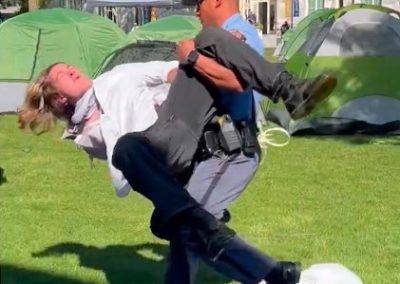You’re a cop. What does this mean? It means you do what’s best in the interest of public safety. You control, regulate, and keep order for a living.
What’s often forgotten? Controlling, regulating, and keeping yourself in order.
Cops often say to each other, “Watch your 6!” That is, you must keep aware of what’s happening behind you and your partners, where bad guys lurk. But what about watching your 12? Who’s making sure you are emotionally intact and not facing a mental ambush that could kill you as quickly as a felon’s bullet?
Sobering Numbers
Why do these concepts matter? Because in 2016, we verified 138 law enforcement suicides. As of November 12, 2017, we have verified 92 to date and we’re still counting. In fact, in the first 12 days of November, we have confirmed 9 suicides.
We need to do better. Recognizing, acknowledging and stopping law enforcement suicide should be the new viral trend in law enforcement. We could talk about stigma, culture, reasons and history, but I’d rather talk about statistics and solutions.
Let’s start with the data we collected in 2016.
Average Years of Service: 17
Average Age: 44
|
Male |
91% |
Patrolmen |
67% |
|
|
Female |
9% |
Rank above Patrolman |
33% |
|
Active Duty |
78% |
Married |
61% |
|
|
Retired |
11% |
Single |
20% |
|
|
Suspended |
5% |
Divorced |
12% |
|
|
Other |
6% |
Other |
7% |
States with the Highest Incidence
|
California |
12% |
|
Massachusetts |
8% |
|
New York |
8% |
|
Texas |
7% |
|
New Jersey |
7% |
This data is not perfect. We know that. We know that there are other suicides we don’t know about. We can only account for what has been reported to us and what we are able to find in the news and on social media. The numbers of officers killed and assaulted in the line of duty is tracked carefully each year, but the number of officers that die by suicide is not.
Many will argue that we cannot track a suicide back to the job. Some of those same people will simultaneously argue that heart disease can be attributed to the job and therefore we are watching that closely. My counter argument is simple: If we can trace heart disease back to the job, we can trace depression, post-traumatic stress disorder, and other emotional disease back to the job. To do so we would need to watch each other closely.
In recent years, the connection between emotional wellness and police work has been gaining attention. In 2013, the IACP held the National Symposium on Law Enforcement Officer Suicide and Mental Health. Many organizations are now hosting wellness conferences and departments are beginning to share programs that work for them with others.
In 2015, the NLEOMF implemented Destination Zero and has awarded an “Officer Wellness” award that is “presented to the law enforcement agency that has taken innovative measures and definitively demonstrated their ability to increase officer wellness.” In May 2017, Chief Mike Goldstein of Plymouth, Minn., received The Excellence in Innovation Award at the Minnesota Chiefs of Police Conference for his wellness program.
The next step with these programs is promoting them. Chief Goldstein is one of many that have joined Blue H.E.L.P. to present their programs at regional conferences around the country.
Blue H.E.L.P. has take a bold, and controversial, step with their website www.honorthem.net. They are putting the names and faces of the officers that die by suicide front and center, with the families permission. They are hosting conferences that are solution-based, bringing in speakers who will show attendees their program and explain how to implement it at their department. These are the kinds of changes that are going to give others the courage to change the culture of law enforcement and encourage officers to seek help.
The good news: We’re clearly heading in the right direction. But we’ll need to keep at it, and that means supporting each other—as individuals, communities, and organizations.
Conclusion
Watch your head and heart. Look at yourself in the mirror and be honest with your emotions. Ask for help when you need it. Believe that things will get better. We’re here to remind you that all is not lost and you can complete a law enforcement career with your heart and mind intact.










Very well said, Karen! While some departments are actively trying to take care of their LEOs, so many others are sweeping this issue of suicide under the proverbial carpet hoping it will go away or pass their departments by. By putting LEO suicide in the light, you are forcing what is seen as a weakness or character flaw by many to be discussed and understood. Only by these discussions will solutions ever be found.